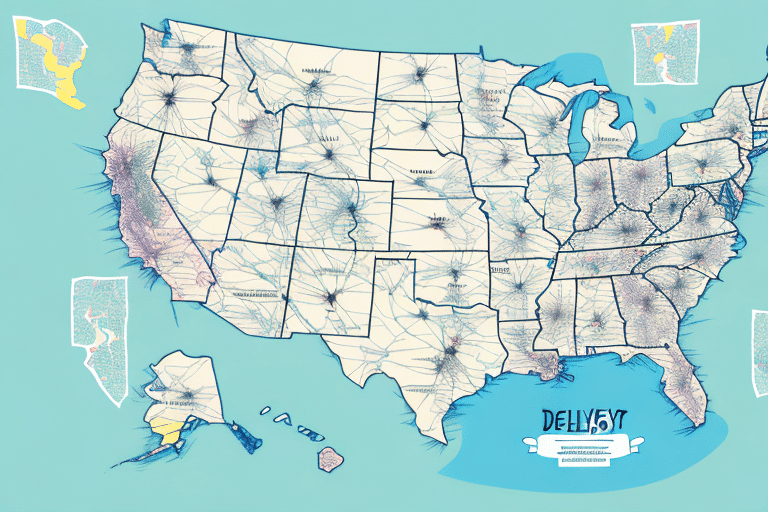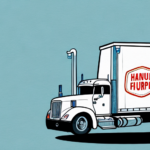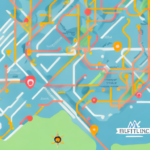Importance of Delivery Route Planning
In today's fast-paced business environment, efficient delivery route planning is essential for maximizing productivity and ensuring customer satisfaction. By optimizing delivery routes, businesses can save time, reduce costs, and minimize their environmental impact.
Boosting Efficiency and Cost Savings
Effective route planning helps avoid unnecessary travel, reducing fuel consumption and vehicle maintenance costs. According to a U.S. Department of Transportation report, optimized routing can cut delivery costs by up to 20%.
Enhancing Customer Satisfaction
Timely deliveries are crucial for maintaining customer trust and loyalty. Efficient route planning ensures that deliveries arrive on schedule, leading to higher customer satisfaction rates.
Environmental Benefits
By minimizing travel distances and optimizing routes, businesses can significantly reduce their carbon footprint. This not only benefits the environment but also enhances the company's reputation as a responsible entity.
Common Challenges in Delivery Route Planning
While delivery route planning offers numerous benefits, businesses often face several challenges in implementing effective strategies.
Variable Delivery Schedules
Managing differing delivery times and customer availability can complicate route planning. Flexibility is key to addressing these variations efficiently.
Traffic and Weather Conditions
Unpredictable traffic jams and adverse weather can disrupt planned routes, leading to delays and increased costs. Incorporating real-time data can help mitigate these issues.
Balancing Efficiency and Customer Needs
Optimizing routes for speed and cost must be balanced with meeting customer preferences and specific delivery requirements.
Strategies for Optimizing Delivery Routes
To overcome challenges and enhance route efficiency, businesses can adopt several strategies.
Data-Driven Approaches
Utilizing data analytics to assess traffic patterns, delivery volumes, and driver performance can inform smarter routing decisions. Tools like Geospatial World provide valuable insights for route optimization.
Incorporating Customer Preferences
Taking into account customer delivery windows and special instructions ensures that routes are tailored to customer needs, improving overall satisfaction.
Considering Goods Characteristics
The nature of the goods being transported, such as perishables or fragile items, requires specific handling and routing considerations to maintain quality and safety.
Leveraging Technology in Route Planning
Technology plays a pivotal role in streamlining delivery route planning and enhancing efficiency.
GPS and Real-Time Tracking
GPS technology allows businesses to monitor driver locations and adjust routes on-the-fly based on current conditions, improving reliability and efficiency.
Automation Tools
Automated scheduling and dispatch systems reduce manual errors and speed up the route planning process, enabling quicker adjustments to changing circumstances.
Customer Notifications
Providing real-time updates to customers through automated notifications enhances transparency and trust, leading to a better customer experience.
Best Practices and Tips for Efficient Routing
Adopting best practices ensures that delivery routes remain efficient and cost-effective over time.
- Consolidate Orders: Grouping multiple orders in a single trip reduces the number of deliveries and associated costs.
- Implement Contingency Plans: Preparing for unexpected delays or route changes helps maintain service reliability.
- Adopt Green Routing: Prioritizing environmentally friendly routes can reduce your carbon footprint and appeal to eco-conscious customers.
- Regularly Review and Optimize: Continuously assessing routes allows for adjustments based on evolving demands and conditions.
Cost Reduction through Effective Route Planning
Optimizing delivery routes directly contributes to significant cost savings for businesses.
Fuel and Maintenance Savings
Reduced travel distances and more efficient routes lead to lower fuel consumption and decreased wear and tear on vehicles.
Fleet Optimization
By analyzing delivery patterns, businesses can optimize the size and utilization of their vehicle fleet, minimizing unnecessary expenses.
Future Trends in Delivery Route Planning
The landscape of delivery route planning is continually evolving, driven by advancements in technology and changing market demands.
AI and Machine Learning
Artificial intelligence and machine learning are increasingly being used to predict delivery patterns and optimize routes dynamically.
Autonomous Vehicles
The integration of autonomous vehicles into delivery fleets promises to enhance efficiency and reduce labor costs in the long term.
Integration with Third-Party Providers
Collaborating with third-party logistics providers allows businesses to leverage specialized expertise and advanced technologies for superior route optimization.
Case Studies: Examples of Successful Delivery Route Planning Strategies
- A retail company utilized real-time tracking and optimized routing software, reducing delivery costs by 18% and improving on-time delivery rates by 25%.
- A logistics firm consolidated routes and optimized delivery schedules, cutting delivery times by 30% and saving $1.2 million annually.
- A distribution company implemented an optimized delivery network, decreasing fleet size by 15% and saving $30 million over three years.
Conclusion
Effective delivery route planning is a critical component of modern business operations. By embracing data-driven strategies, leveraging advanced technology, and adopting best practices, businesses can enhance efficiency, reduce costs, and deliver superior customer experiences. Staying abreast of future trends ensures that companies remain competitive and responsive to the evolving demands of the marketplace.




















